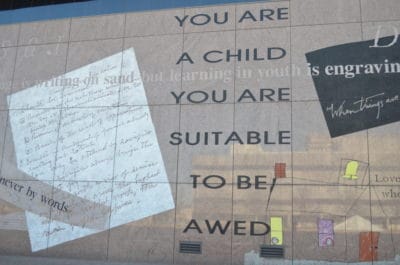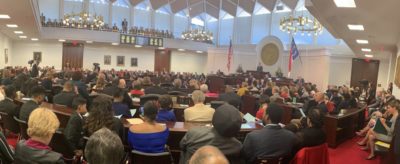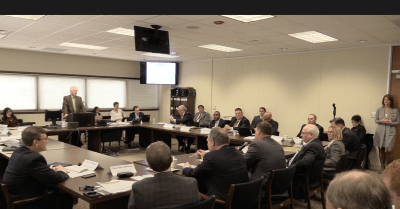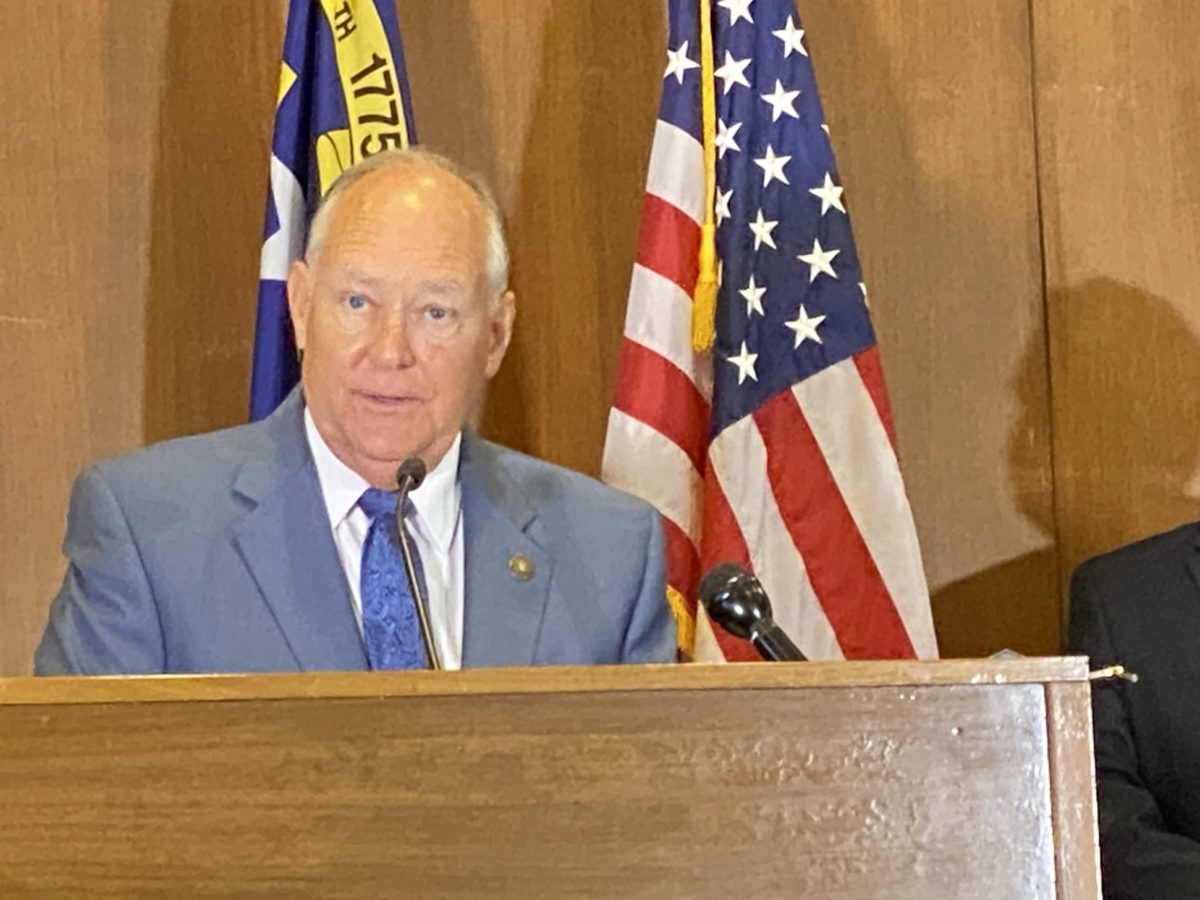
Editor’s note: When the bill finally came out, the amount of the checks that would go to families with children was $335.
At a press conference today, legislative Republicans in the North Carolina House and Senate said they will hold what is expected to be a quick legislative session this week to spend federal COVID-19 relief funds on a slew of items. The list includes $325 checks to families with children and the expansion of programs that provide public funds for students to attend private schools. They also plan to hold districts harmless for declines in average daily membership this school year.
“With schools closed, parents are facing many unexpected financial burdens,” said Sen. Brent Jackson, R-Duplin, of the $325 checks to families. “This assistance is meant to alleviate some of that burden, and show that we care.”
First the Senate, and then the House, will vote on a COVID-19 relief bill this week that includes $440 million in federal COVID-19 relief funds to give $325 to every family that has at least one child.
The legislation will also include an easing of financial requirements for the opportunity scholarship program, which provides tuition assistance up to $4,200 per year for students who enroll in private school. According to Sen. Deanna Ballard, R-Watauga, the requirement will change so that students can qualify if their family is at 150% of the amount of money required for a student to qualify for free-and-reduced price lunch. Currently, that threshold is at 133%.
“We will be increasing an option for families to choose an education that best meets and fits the need for their kids,” Ballard said.
She said a family of four making $72,000 could now qualify for the opportunity scholarships.
The legislation will also remove the cap on the number of kindergarten and first grade opportunity scholarships that can be given out each year.
In addition, the legislation will increase funding for both the special education scholarship grants for children with disabilities and the education savings account (ESA) program, according to Sen. Joyce Krawiec, R-Forsyth. Both of these programs also provide money that low-income students can use to attend private schools. The goal of the increased funding for the ESA and disability grants is to eliminate the waiting list of people who want to participate.
The school choice-related provisions may be a hard sell for Democratic Gov. Roy Cooper, who wants to slash the non-obligated funds in the opportunity scholarship budget to pay for other K-12 items.
Sen. Jim Perry, R-Lenoir, explained what would be in the bill for child care, saying that COVID-19 has increased the costs to child care providers as they try to deal with the extra regulations they have to adhere to. He said the legislation will include $35 million in flexible operational grants to child care centers.
“We owe it to them to provide additional operational grants,” he said.
He also said that under the legislation, community-based organizations like the YMCA would be able to open up and offer a space for remote learning. The legislation will make $20 million in grants available to help with this. Eight million dollars will also be provided as a subsidy to help low-income families offset their child care costs.
Ballard also said the legislation includes $50 million for other K-12 items, including about $10 million for student connectivity, $20 million for personal protective equipment, and $17 million for exceptional children students.
The legislative package is also supposed to include $30 million for the Growing Rural Economies with Access to Technology (GREAT) program. This is a program that tries to increase broadband internet in “economically distressed” counties.
Though it wasn’t mentioned during the actual press conference, Pat Ryan, spokesman for Senate President Pro Tempore Phil Berger, R-Rockingham, confirmed that an average daily membership hold harmless is also included in the legislation.
Average daily membership (ADM) is used to get a snapshot of how many students are in schools. Districts get funding based on their projected ADMs. If the actual ADM is lower than projected, districts can face budget reductions.
School districts and education leaders have been anxiously asking the legislature for a hold harmless because of worries that COVID-19 impacts are causing a lower number of students to show up for school than projected. A hold harmless would keep districts’ budgets whole at least for the current year.
Another provision in the bill would allow the state’s two virtual charter schools to increase their enrollment for this school year. A proposal was before the State Board of Education in August to increase the enrollment at the two schools to help deal with the influx of families looking for virtual options, but the State Board voted the proposal down, mostly along party lines.
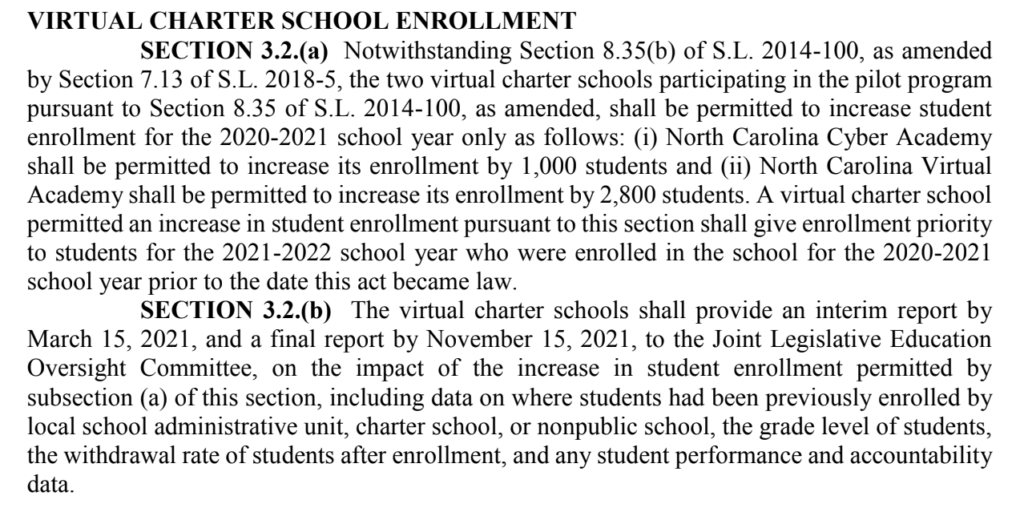
Though the Senate is slated to vote on this legislative package tomorrow, a bill isn’t yet available on the General Assembly website. Berger published a sneak peak on his Medium.com page, however. This legislation is a continuation of work the legislature has been undertaking to spend federal relief funds to mitigate impacts from COVID-19. Lawmakers are hoping to be in town only Wednesday and Thursday.
The Democratic minority leader in the House, Darren Jackson, D- Wake, had the following to say in a press release about the Republican’s budget plans for this week.
“While North Carolina families are facing multiple devastating crises, the proposed GOP budget is completely inadequate for meeting our state’s needs and will leave working North Carolinians behind. This budget provides nothing for teachers and nothing to expand access to affordable health care. Instead, it provides more taxpayer dollars for private schools and special interests. It’s a band-aid that looks good in a press release but does nothing to solve the long term effects of this pandemic. North Carolinians deserve better than election year stunts — we need a real budget that offers real solutions.”
Cooper released his budget desires last week. And representatives from the K-12 and community college systems presented their budget asks to House lawmakers last week as well. Read about those here.
Republicans have the numbers needed to pass this legislation, though they don’t have the numbers needed to override a veto alone if Gov. Cooper decides to strike down the legislation. They would need votes from some Democratic lawmakers.
Recommended reading
